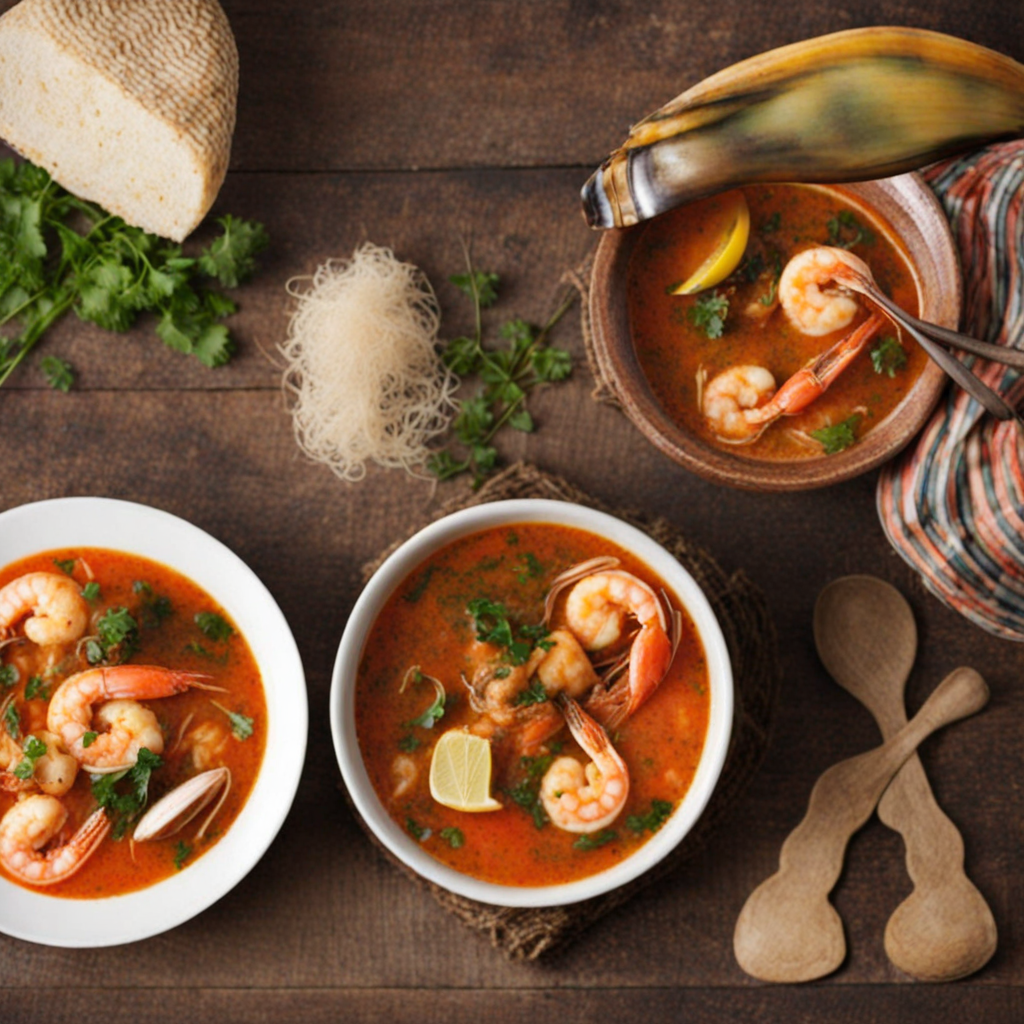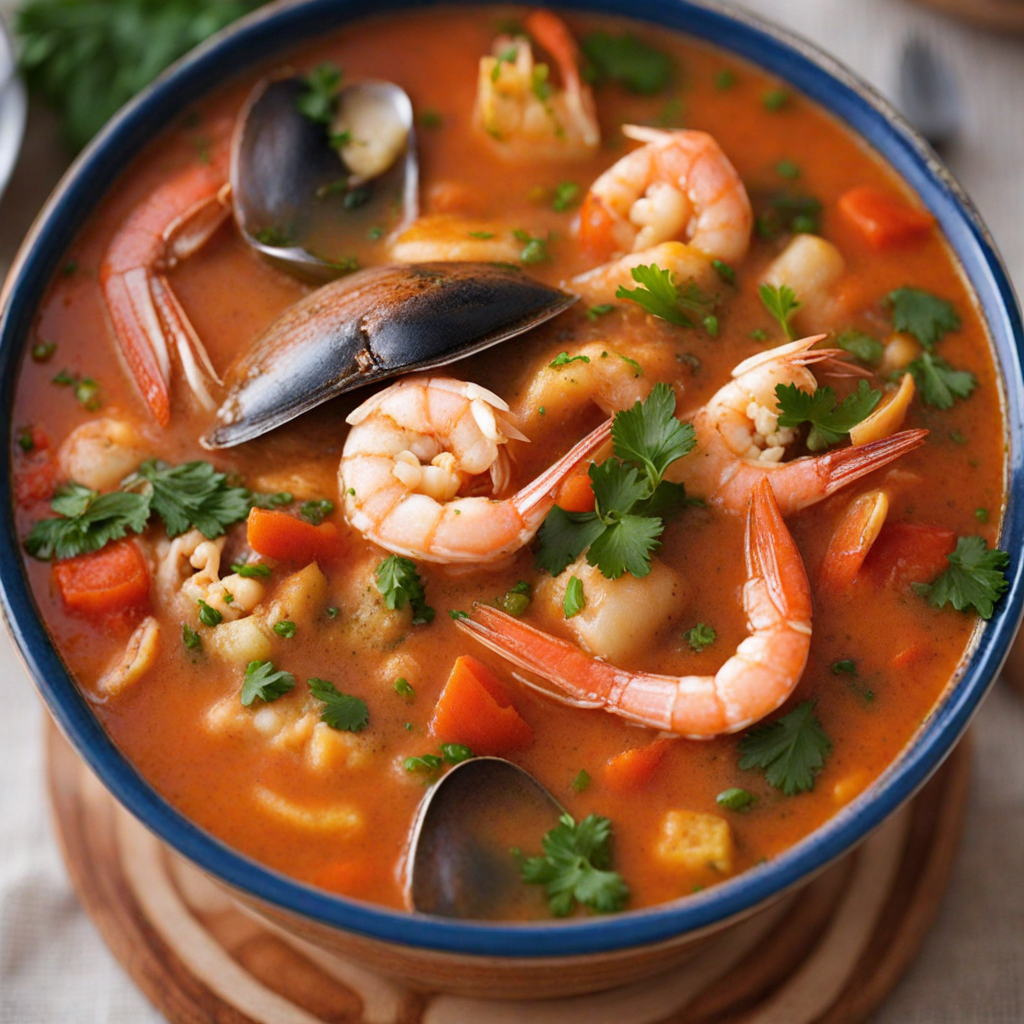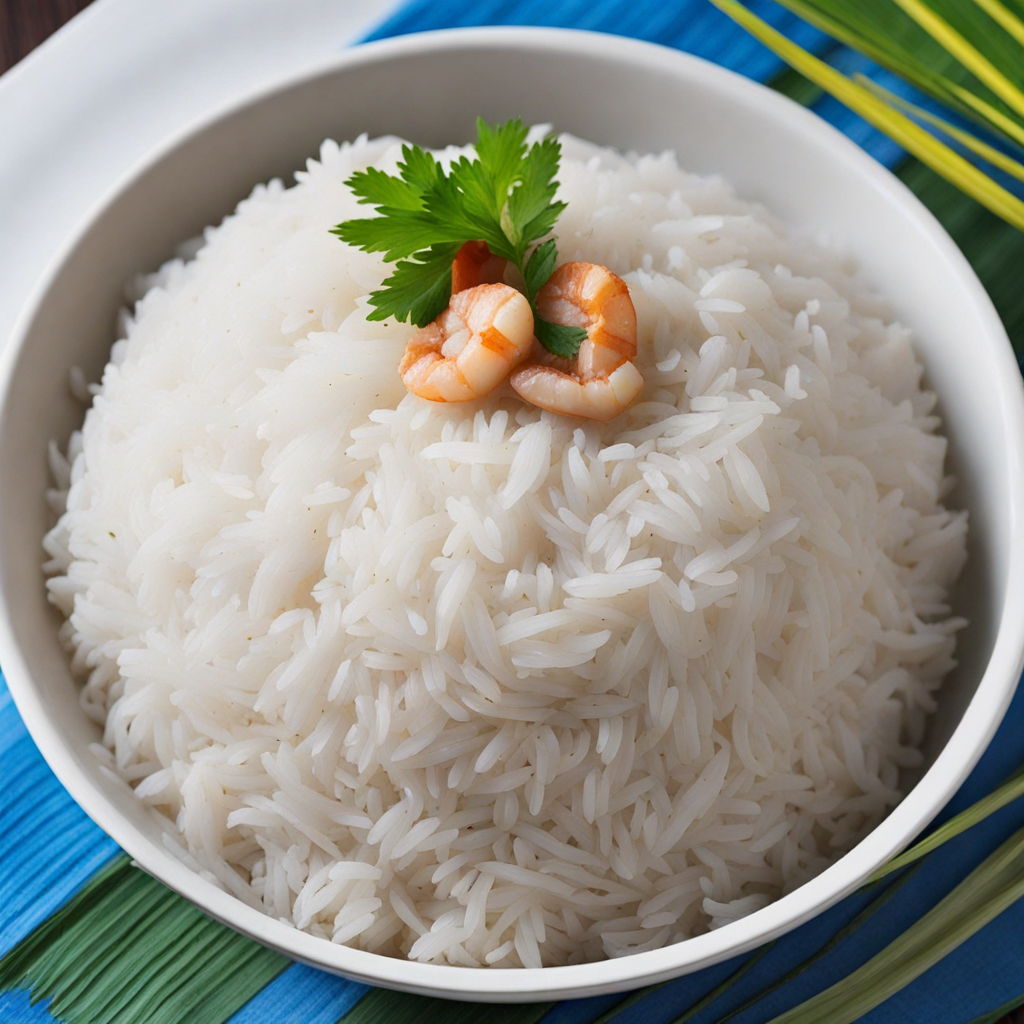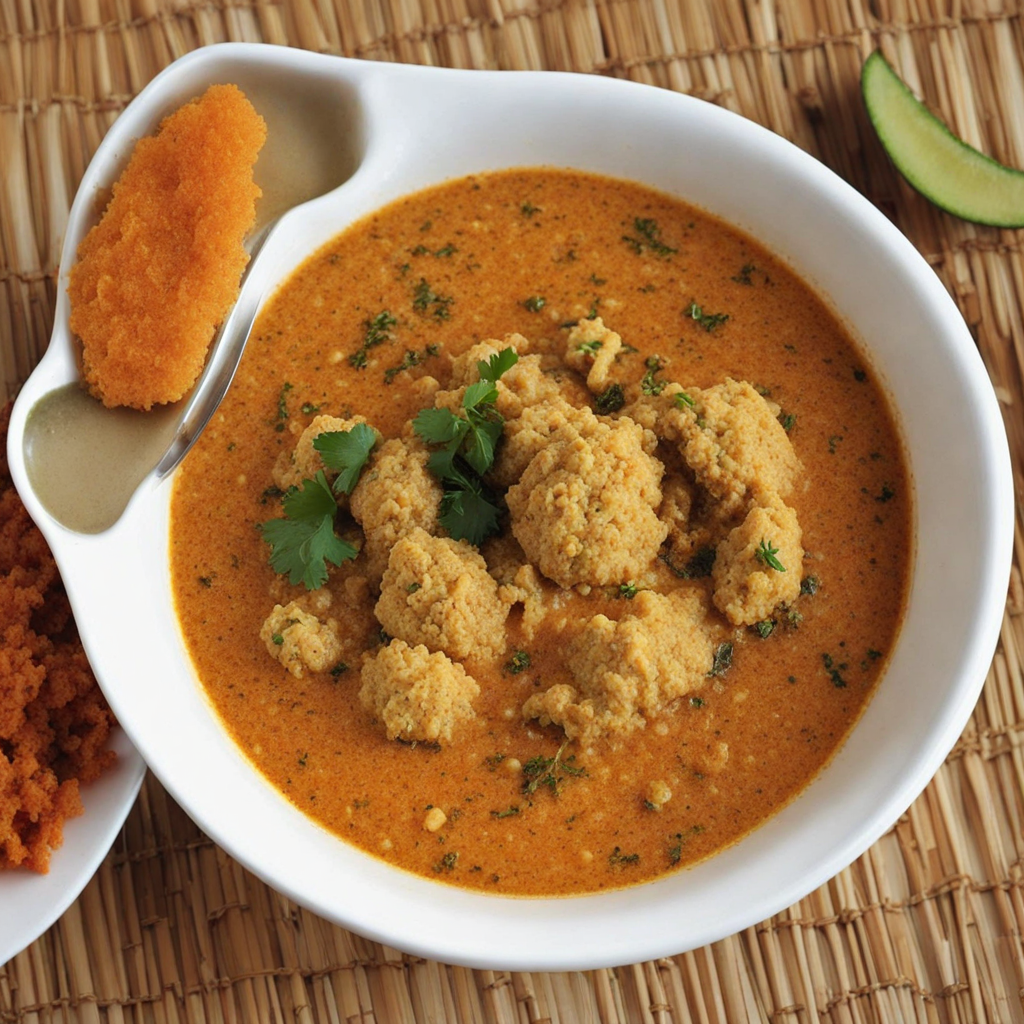Fisherman’s Soup
Fisherman’s Soup, known locally as 'Nkyene Nkuto,' is a vibrant and hearty dish that captures the essence of Ghana's coastal culinary traditions. This soup is a delightful blend of fresh fish, often caught the same day, combined with an array of flavorful ingredients such as tomatoes, onions, and a variety of spices. The use of local fish, such as tilapia or mackerel, imparts a distinct taste that reflects the rich waters of the Atlantic Ocean, making each bowl a celebration of the sea. The fish is typically simmered with the vegetables to create a rich broth that is both comforting and invigorating, perfect for those seeking a taste of Ghanaian hospitality. What sets Fisherman’s Soup apart is the inclusion of unique ingredients like ground crayfish and pepper, which add depth and a subtle heat to the dish. A splash of palm oil not only enriches the flavor but also gives the soup its characteristic golden hue. Served alongside a side of rice balls or boiled plantains, this dish is not just a meal but an experience that showcases the culinary artistry of the Ghanaian people. The combination of flavors creates a delightful balance between the freshness of the fish and the warmth of the spices, making each spoonful a satisfying adventure. Fisherman’s Soup is often enjoyed during communal gatherings and special occasions, reflecting its role in bringing people together. The communal aspect of sharing this dish enhances the experience, as families and friends come together to savor the flavors while creating lasting memories. For those looking to explore new culinary horizons, Fisherman’s Soup offers a taste of Ghana that is both authentic and unforgettable, inviting you to dive into the rich tapestry of its cuisine.
How It Became This Dish
Fisherman’s Soup: A Culinary Journey Through Ghana #### Origins and Early History Fisherman’s Soup, known locally as "Fante Fante," is a delectable dish that hails from the coastal regions of Ghana, particularly among the Fante people of the Central Region. The dish is deeply rooted in the maritime lifestyle of the Ghanaian coastal communities, where fishing has been a primary source of livelihood for generations. The origins of Fisherman’s Soup are tied to the rich cultural tapestry of Ghana's coastal tribes, where fishing is not just an economic activity but a way of life. The Fante people, renowned for their fishing skills, developed this dish as a means to celebrate their bountiful catches. The soup traditionally incorporates fresh fish, often from the day's haul, along with locally sourced ingredients such as tomatoes, peppers, onions, and various spices. This combination reflects the natural abundance of the sea and the agricultural richness of the land. #### Cultural Significance Fisherman’s Soup holds immense cultural significance for the communities that cherish it. It is more than just a meal; it is a symbol of community, resilience, and connection to nature. Fishermen often gather to share not only their catches but also stories and experiences over a steaming pot of Fisherman’s Soup. This communal aspect of the dish mirrors the broader Ghanaian ethos of hospitality and sharing, where food serves as a medium for bonding and celebration. In many coastal towns, the preparation of Fisherman’s Soup is accompanied by traditional ceremonies, where elders bless the fishermen before they embark on their voyages. The soup's ingredients are often seen as offerings to the sea, invoking the spirits of ancestors and seeking protection and prosperity. As such, Fisherman’s Soup is not merely a culinary delight but also a spiritual ritual, bridging the gap between the physical and metaphysical realms. #### Ingredients and Preparation The beauty of Fisherman’s Soup lies in its versatility. While the core ingredients remain consistent, variations abound depending on regional preferences and seasonal availability. The soup typically features fresh fish—often mackerel, tilapia, or catfish—alongside a base of blended tomatoes, onions, and chili peppers, which create a rich, flavorful broth. To prepare Fisherman’s Soup, the fish is usually cleaned and seasoned with salt and spices before being added to the simmering broth. The addition of vegetables like okra or garden eggs (African eggplant) enhances the texture and nutritional value of the dish. Finally, palm oil is often drizzled into the soup, imparting a distinct color and flavor that is characteristic of Ghanaian cuisine. In many households, Fisherman’s Soup is served with a side of rice, boiled plantains, or fufu (a starchy side made from cassava or plantains), which helps soak up the flavorful broth. This combination of soup and starchy sides not only satisfies hunger but also showcases the culinary diversity of Ghana. #### Development Over Time Over the years, Fisherman’s Soup has evolved, embracing influences from various cultures while remaining true to its roots. The arrival of European traders and colonial influences in the 19th and early 20th centuries introduced new spices and cooking techniques to Ghanaian kitchens. These external influences have been absorbed into the traditional preparation of Fisherman’s Soup, leading to exciting variations that reflect an ever-changing culinary landscape. In contemporary settings, Fisherman’s Soup has gained popularity beyond the coastal regions. Urbanization and globalization have introduced the dish to a broader audience, with restaurants and food vendors serving it in bustling cities like Accra and Kumasi. As a result, Fisherman’s Soup has become a symbol of Ghanaian cuisine, celebrated not only for its rich flavors but also for its cultural heritage. Social media and food blogs have played a significant role in promoting Fisherman’s Soup to both local and international audiences. Culinary enthusiasts are increasingly seeking authentic experiences, and traditional dishes like Fisherman’s Soup have found their way onto international menus, showcasing Ghana's culinary heritage on a global stage. #### Contemporary Significance Today, Fisherman’s Soup remains a beloved dish among Ghanaians, symbolizing the resilience of coastal communities and their connection to the sea. It is often enjoyed during special occasions, celebrations, and family gatherings, reinforcing its status as a dish of communal significance. Additionally, Fisherman’s Soup has become a platform for discussions surrounding sustainability and the future of fishing in Ghana. Overfishing and environmental challenges threaten the livelihoods of many fishermen, prompting conversations about sustainable practices and responsible consumption. As communities grapple with these issues, Fisherman’s Soup serves as a reminder of the delicate balance between humanity and nature, urging a collective responsibility toward preserving the resources that have sustained generations. #### Conclusion Fisherman’s Soup is more than just a dish; it is a vibrant narrative that encapsulates the history, culture, and evolution of Ghanaian coastal communities. Its rich flavors and communal spirit reflect the resilience of the people who have nurtured this culinary tradition over the centuries. As Ghana continues to evolve, Fisherman’s Soup stands as a testament to the enduring bond between food, culture, and identity, inviting both locals and visitors to partake in its rich history and savor its flavors. Whether enjoyed in a bustling market, a family home, or an upscale restaurant, Fisherman’s Soup is a celebration of Ghana’s maritime heritage, a dish that nourishes both the body and the spirit, and a culinary emblem of the country’s vibrant culture. As the world becomes increasingly interconnected, Fisherman’s Soup serves as a delicious reminder of the importance of preserving culinary traditions, fostering community ties, and respecting the natural world that sustains us all.
You may like
Discover local flavors from Ghana







